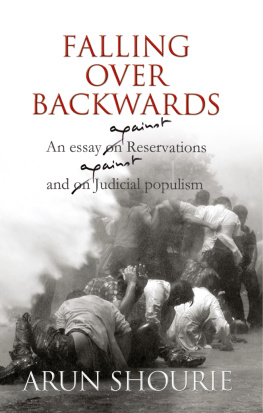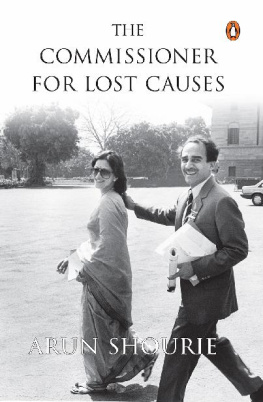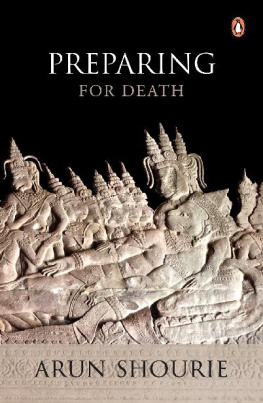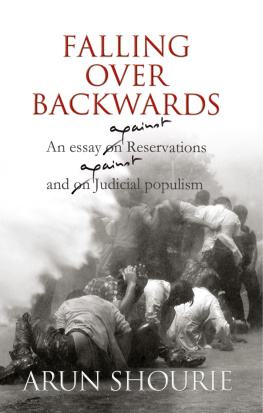arun shourie - Falling Over Backwards
Here you can read online arun shourie - Falling Over Backwards full text of the book (entire story) in english for free. Download pdf and epub, get meaning, cover and reviews about this ebook. year: 2012, genre: Politics. Description of the work, (preface) as well as reviews are available. Best literature library LitArk.com created for fans of good reading and offers a wide selection of genres:
Romance novel
Science fiction
Adventure
Detective
Science
History
Home and family
Prose
Art
Politics
Computer
Non-fiction
Religion
Business
Children
Humor
Choose a favorite category and find really read worthwhile books. Enjoy immersion in the world of imagination, feel the emotions of the characters or learn something new for yourself, make an fascinating discovery.
- Book:Falling Over Backwards
- Author:
- Genre:
- Year:2012
- Rating:3 / 5
- Favourites:Add to favourites
- Your mark:
- 60
- 1
- 2
- 3
- 4
- 5
Falling Over Backwards: summary, description and annotation
We offer to read an annotation, description, summary or preface (depends on what the author of the book "Falling Over Backwards" wrote himself). If you haven't found the necessary information about the book — write in the comments, we will try to find it.
Falling Over Backwards — read online for free the complete book (whole text) full work
Below is the text of the book, divided by pages. System saving the place of the last page read, allows you to conveniently read the book "Falling Over Backwards" online for free, without having to search again every time where you left off. Put a bookmark, and you can go to the page where you finished reading at any time.
Font size:
Interval:
Bookmark:

Falling Over Backwards
An essay on Reservations and on Judicial populism
ARUN SHOURIE

In memory of my mother and father
Zindagi ke har ik mod pe nazar aayaa
Teri nigaah-e-karam kaa ghanaa ghanaa saayaa...
Firaq
Contents
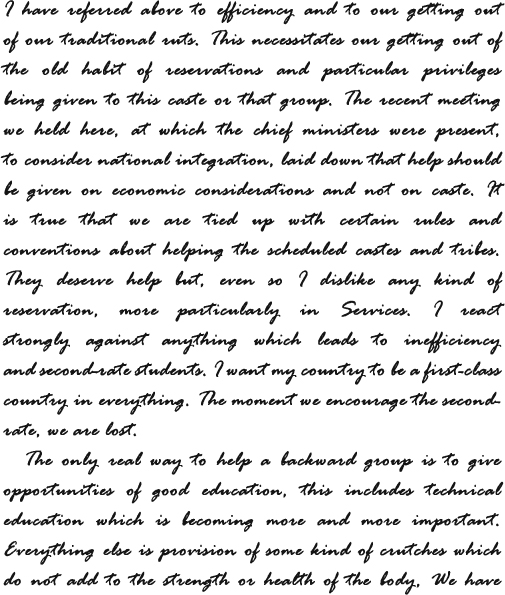
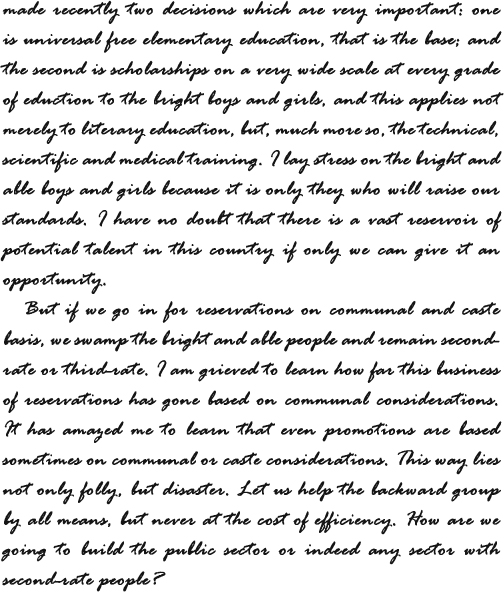
Jawaharlal Nehru, Letter to chief ministers, 27 June 1961
Merit and efficiency is [sic] a pure Aryan invention, aimed at maintaining their monopoly, the Supreme Court judgment quotes, with manifest approbation, from the typical write-up of a propagandist. The title of the write-up is, Merit, my foot. A reply to Anti-Reservation Racists. Nowhere in the world, the Supreme Court says on the authority of this person, are merit and efficiency given so much importance as in India which is now pushed to the 120th positionvirtually the last among different countries in the world. Upper caste rulers of India, it continues on the same persons authority, keep the countrys vast original inhabitantsUntouchables, Tribals, Backward Castes and religious minoritiespermanently as slaves with the help of this merit mantra. By merit and efficiency they mean the birth. Merit goes with the highbornthe blue blood. This is pure and simple racism. That birth and skin-colour have nothing to do with merit and efficiency (brain) is a scientifically proved fact. But the ruling class nowhere in the world is concerned with science because science stands for progress. And those interested in progress will have to be human. That is not so in India. If one has to see mans inhumanity to man in its most naked form he must come to India, the original home of racism and inequality. So, the merit theory beautifully suits its ruling class or caste....
The author of the publication which the Supreme Court cites to buttress its judgment is a rabid propagandist. He is given to hurling the vilest abuse. For years and years he and his venomous rag of a journal have lauded the British rulers and British rule; they have hailed those who helped conquer India for the British; they have advocated violence. And here we have the Supreme Court of India relying on the rant to fortify its judgment!
But why look at what the Supreme Court cites? Why not look at what it says on its own? Efficiency is very much on the lips of the privileged whenever reservation is mentioned, it declares in a judgment that we shall examine in a moment. Efficiency, it seems, will be impaired if the total reservation exceeds 50%; efficiency, it seems, will suffer if the carry forward Rule is adopted; efficiency, it seems, will be injured if the Rule of reservation is extended to promotional posts. From the protests against reservation exceeding 50% or extending to promotional posts and against the carry forward Rule, one would think that the civil service is a Heavenly Paradise into which the archangels, the chosen of the elite, the very best may enter and may be allowed to go higher up the ladder. But the truth is otherwise, it continues. The truth is that the civil service is no paradise and the upper echelons belonging to the chosen classes are not necessarily models of efficiency. The underlying assumption, the court asserts, that those belonging to the upper castes and classes, who are appointed to the non-reserved posts will, because of their presumed merit, naturally perform better than those who have been appointed to the reserved posts and that the clear stream of efficiency will be polluted by the infiltration of the latter into the sacred precincts is a vicious assumption, typical of the superior approach of the elitist classes. And what is merit?, it demands. And answers: There is no merit in a system which brings about such consequences... Always one hears the word efficiency as if it is sacrosanct and the sanctorum has to be fiercely guarded..., it declares. Efficiency is not a mantra which is whispered by the Guru in the shishyas ear, it scoffs. The days of Dronacharya and Ekalavya are over...., it warns.
This essay is about how we have got from Panditjis This way lies not only folly, but disaster, to pronouncements of this kind.
The basic explanation, of course, is the direction that politics has taken. As politicians and political parties have been less and less able to commend themselves on the basis of their performance, they have deployed a standard technique: look for a grievance, for some measure by which it can be shown that the target group has been left behind; when you cant find the grievance, invent it; stoke the sense of being discriminated against; frighten the group into believing that others are out to take away even more of what is its right; and present yourself as the only available saviour. Inevitably, in each succeeding round, two things have happened. On the one side, the grievances that have been stoked have been more and more far-fetched. On the other, the group at which the rhetoric has been directed has been narrower and narrower.
In the end, politicians pass laws. They appoint judges as much as vice chancellors and IGs of police. Hence, the ultimate responsibility lies with them. But they have received much help from othersthe progressives who have dominated public discourse, for instance; a handful of progressive judges, for another. This essay is primarily about these aiders and abettorsfor at least some of them, the word should really be instigators. In a word, it is about the turn that discourse has taken in the last thirty years, and the price that the country has to pay for it today.
Both the perversity and the costs could have been illustrated by the rhetoric of political leaders, the harangues of the large number who have lunged for casteist politics. But their declarations are so vapid that it is almost an insult to devote a book to them.
Both the perversity and the costs could just as easily have been illustrated by examples from the writings of many of our progressive commentators. But there are three drawbacks to citing them. Their writings are the staple of our journals and newspapers. The book would, therefore, become ten times more voluminous. Moreover, as they have hogged public space for thirty years, the reader can himself garner the examples with ease. And then there is always the problem: we have but to cite one of them, and so many are apt to question his significance, and of his pronouncements.
I have, therefore, chosen to illustrate the descent, and to depict the consequences, with judgments of our Supreme Court.
That, of course, eliminates one problem: no one can turn back and say of the judges, But who are they? But it leaves another. The judgments are prolix and repetitive in the extreme. The progressive judges, no less than their counterparts in the popular media, just keep repeating a standard set of assertions. They just keep invoking each other. Hence, on occasion, as the reader comes to a passage, he might feel, Hasnt that been set out in the book already?
But for at least four reasons I would hope that he will still wade through each successive passage. One, given what the judges do, that sort of repetitionthey would use the word reiterationis inevitable. Two, in fact the succeeding judges do not just reproduce what the earlier progressives have said. They build on it. In a sense, each feels compelled to build on the radical magniloquence of the one he is invoking. He feels compelled to invent yet another reason, to paste an even viler motive.... He adds a phrase, he loosens a condition, sometimes he adds just one wordmost often we would not even notice the addition, yet each addition lowers standards another notch. Three, on occasion the passage illustrates different facets of the reasoning on which the progressives build their assertions: to see its full import, we must reflect on the passage in different contexts. Most important, we must know those whom we must obey: as judges are among them, we must read what they have to sayas much as possible in their own words.
Next pageFont size:
Interval:
Bookmark:
Similar books «Falling Over Backwards»
Look at similar books to Falling Over Backwards. We have selected literature similar in name and meaning in the hope of providing readers with more options to find new, interesting, not yet read works.
Discussion, reviews of the book Falling Over Backwards and just readers' own opinions. Leave your comments, write what you think about the work, its meaning or the main characters. Specify what exactly you liked and what you didn't like, and why you think so.

